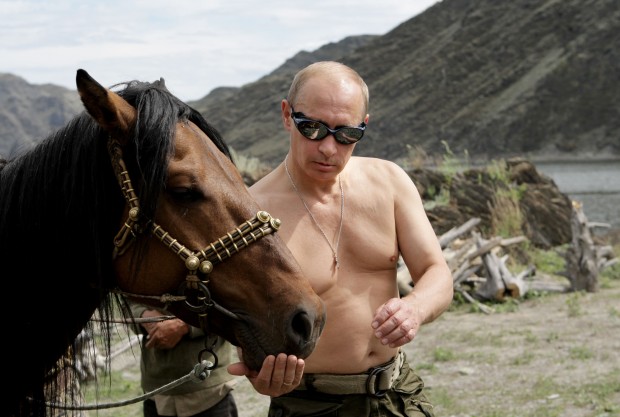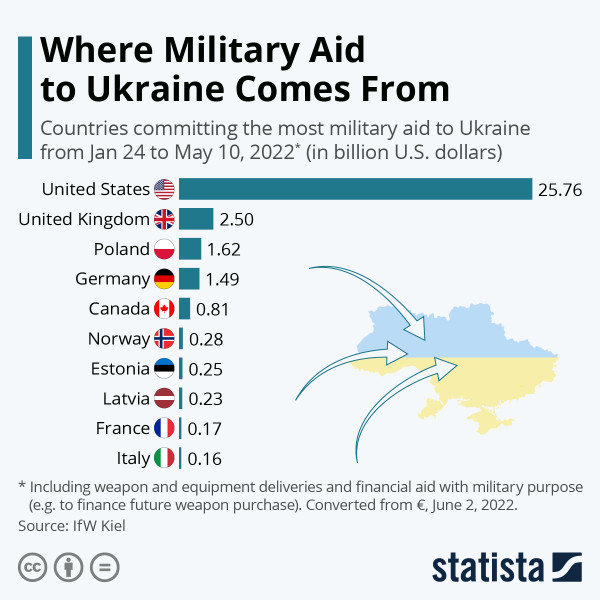Europe's dream of Putin's face: bare-chested, on horseback and undefeated

If this were not a war, one could say that Western countries' boasting about military aid to Ukraine and then withdrawing it on all sorts of pretexts is starting to look comical. The total value of the aid provided by Germany is a mere 0.06% of its GDP. And the solutions proposed by some of the major powers to end the war are absurd at their very core.
The peace plan that Italy drew up was a recommendation that Ukraine should accept the autonomy of the territories it had been deprived of - that is to say, de facto Russian control. The Italians could just as well have offered to give Russia its Sardinia in exchange for world peace. French President Emmanuel Macron has also become a laughingstock even in diplomatic circles, first with his regular phone calls to Russian President Vladimir Putin and, more recently, with his proposal to Ukraine to make concessions on sovereignty, allowing Putin to save face. (Probably like the 2009 election campaign - bare-chested on a horse.) And in general, we should avoid humiliating Russia. What does the European diplomatic establishment have to say about these Italian and French moves? The Italian peace plan is seen more as a solo move by one minister, because the Italians have generally changed their attitude toward what is happening in Ukraine, as have the Spaniards. And Macron's call not to humiliate Putin and to write off the occupied Ukrainian territories in order to avoid a direct Western conflict with Russia is considered immoral, even in diplomatic circles. Ukraine is not going to lay down its arms and give up its land to an aggressor. But in war, weapons are destroyed, lost, and more and more are needed.
We must start giving modern weapons

From the podiums of the European Union and the NATO Member States, it is chanted every day that the Ukrainians are fighting for the whole civilized world. That is why they must be supplied more and supplied better. So far, supplies have been coming in dribs and drabs. The first shipments were easier to complete because most countries anticipated that Ukraine would soon fall and that they would then have to deliver to Ukraine wreaths of mourning rather than guns. But after the first shipments, more were asked, and it soon became clear that the Member States had run out of Soviet-made weapons and had to start bringing in modern weapons systems that were more powerful, more accurate and more dangerous. But these systems also need to be loaded with something. Some missiles fly close, others far, and it is with the supply of medium- and long-range missiles that a lot of problems are going on at the moment. The suppliers have to calculate whether missiles given to the Ukrainians could reach Crimea, which Russia considers to be its own. And that is why the US, for example, will supply missiles that fly 70 kilometers instead of 300 kilometers, and will not supply digital guidance control systems that ensure excellent accuracy. So with this superior weaponry, the Ukrainians will only be able to make relatively humble shots. But this does not prevent arms suppliers from boasting about their deliveries.
Scholz is talking nonsense
The other day, German Chancellor Olaf Scholz boasted when he visited Vilnius. Here is what he said, as reported by LETA news agency: "Germany is one of the key military supporters of Ukraine, with probably only the United States providing more support, but Germany is certainly providing a lot of assistance to Ukraine. The most sophisticated howitzers are set to be delivered to Ukraine." The wishful expression at the end of this quote suggests that the same thing will happen with these howitzers as has happened before with tanks, with aircraft, with armored vehicles that are first promised with great pomp and then shamefully withdrawn. As for the aid that Germany is already providing, it is certainly not even close to that provided by the United States, and several other countries are significantly ahead of Germany. Moreover, what is being donated is also important. Nobody is fighting with ambulance cars, just as they are not shooting MREs at the enemies. Sure, soldiers need to be fed and patched up, but the enemy does not die from it and enemy weapons are not destroyed.
The Kiel Institute for the World Economy regularly monitors military, economic and humanitarian aid to Ukraine. This does not include private donations, which, because of the passivity of national governments to date, are also flowing to Ukraine in large quantities. The latest survey covers the period up to May 10. And the whole picture is this.
The EU moves at a snail's pace
In absolute terms, the US is the top aid provider to Ukraine by a huge margin, with $25.76 billion. The UK follows with 2.5 billion, Poland with 1.62 billion and Germany in only fourth position with 1.49 billion. Latvia boasts 230 million in aid to Ukraine, ahead of both great France and mighty Italy. If the aid given is measured against the gross domestic product, the biggest supporters of Ukraine are, in order, Estonia, Latvia, Poland and the USA, while Germany, with its countless promises, is only 14th in practice with 0.06% of GDP. Researchers are astonished at Europe's passivity in supporting Ukraine:
"EU countries and EU institutions have committed 16 billion euros, only about one-third of what the U.S. has pledged. This large discrepancy is surprising. One might expect the EU to help a neighboring country at least to a similar level as the distant United States. But EU countries have been moving much more slowly for weeks, not only in arms deliveries, but also in financial and humanitarian assistance." For more information on the results of the Ukraine aid monitoring, click HERE.
Aid as scarce as hen's teeth
What does Ukraine need to drive Russia off its soil and save Europe from the Russian invasion? The figures released so far are that Ukraine needs at least 60 SAMs, 400 tanks, 500 howitzers, 20 Bayraktar drones and a whole lot more infantry fighting vehicles to move 25,000 troops from five mechanized brigades onto the battlefield. The importance of the number of weapons was recently explained in a popular-scientific manner to The Guardian by Oleksiy Arestovych, military adviser to the Ukrainian president’s chief of staff:
"Ukraine needs 60 multiple rocket launchers - many more than the handful promised so far by the UK and US - to have a chance of defeating Russia. If we get 60 of these systems then the Russians will lose all ability to advance anywhere, they will be stopped dead in their tracks. If we get 40 they will advance, albeit very slowly with heavy casualties; with 20 they will continue to advance with higher casualties than now."
The 100th day of the war is already behind us, but Britain has promised to send only three missile systems. Countries that do not want to get involved in the war have the best chance of supplying the Ukrainians with adequate armaments. This is particularly true of the great European powers.